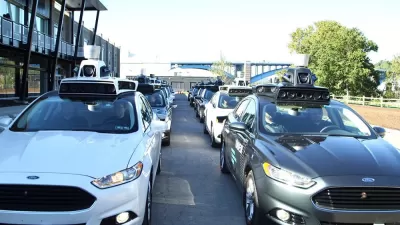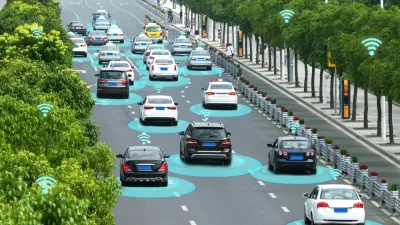The slow progress of autonomous vehicle and electric vehicle technology in gaining widespread traction in the transportation market is casting doubt on the ambitious statements of a few years prior.

Jeffrey Rothfeder writes a long-read on a lack of progress in the autonomous vehicle industry, which reveals plenty of reason for skepticism about the past promises from industry leaders about the pace of change in the transportation sector.
Evidence for skepticism takes many forms, like court documents unsealed in 2017 related to a lawsuit filed against the ride-sharing company Waymo, Google’s self-driving car unit. "Simply put, Uber—and, as it turns out, many other automobile manufacturers—have been wildly overpromising," reports Rothfeder.
Many of Uber's projections were made without any data to back up their aggressive timeline. Assumptions and estimates deployed, not projections that have proven accurate.
After the court documents were unsealed, Uber officials have taken a more cautious approach. Earlier this month, "the company’s CEO Dara Khosrowshahi said at an Economic Club meeting in Washington, DC, that it will take more than 50 years for all Uber cars to be driverless, a lifetime away," writes Rothfeder.
Rothfeder finds many more examples of the same kind of exuberance in the electric vehicle realm. The reality has proven wildly underwhelming compared to projects. For instance, "in 2010, J.D. Power and Associates predicted that within a decade, global hybrid and EV annual sales would top five million units. The EV segment is nowhere near that goal and, if anything, is retrenching.
There is a lot more detail, evidence, and anecdote provided in this long read. The business of transportation technology research and development is changing as the challenges of delivering widespread, systematic change in mobility become more obvious than the over exuberance of tech "visionaries."
FULL STORY: For years, automakers wildly overpromised on self-driving cars and electric vehicles—what now?

Planetizen Federal Action Tracker
A weekly monitor of how Trump’s orders and actions are impacting planners and planning in America.

Maui's Vacation Rental Debate Turns Ugly
Verbal attacks, misinformation campaigns and fistfights plague a high-stakes debate to convert thousands of vacation rentals into long-term housing.

Cuomo Is the Candidate of Both NIMBYs and Developers. What Gives?
In the New York City mayoral race, odd bedfellows align to preserve the housing status quo.

The Subversive Car-Free Guide to Trump's Great American Road Trip
Car-free ways to access Chicagoland’s best tourist attractions.

San Antonio and Austin are Fusing Into one Massive Megaregion
The region spanning the two central Texas cities is growing fast, posing challenges for local infrastructure and water supplies.

Charlottesville Temporarily Has No Zoning Code
A judge ordered the Virginia city to throw out its newly revised zoning code, leaving permitting for new development in legal limbo.
Urban Design for Planners 1: Software Tools
This six-course series explores essential urban design concepts using open source software and equips planners with the tools they need to participate fully in the urban design process.
Planning for Universal Design
Learn the tools for implementing Universal Design in planning regulations.
Heyer Gruel & Associates PA
JM Goldson LLC
Custer County Colorado
City of Camden Redevelopment Agency
City of Astoria
Transportation Research & Education Center (TREC) at Portland State University
Jefferson Parish Government
Camden Redevelopment Agency
City of Claremont





























